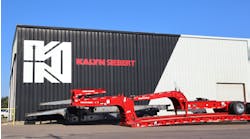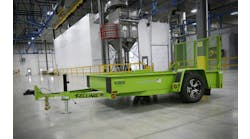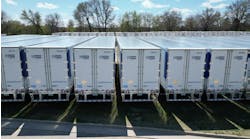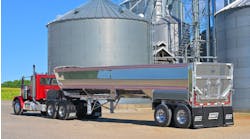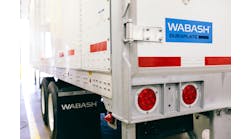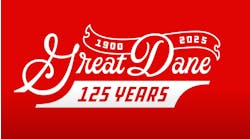Praising company-wide “resilience” in working through the challenges of 2020 and emphasizing “optimism” for 2021 and beyond, Wabash National Corp. President and CEO Brent Yeagy on Feb. 3 reported net sales for the fourth quarter 2020 were $404.1 million while operating income was $10 million. Those figures compare to net sales of $579 million and operating income of $31.8 million in the fourth quarter 2019.
“As we all know, we learn the most about ourselves and the organizations from the challenges we encounter. It is also through these challenges that we prove what we are capable of,” Yeagy said in discussing the Q4 and year-end results with investment analysts. “First and foremost, our employees came through for us in 2020. Our team was able to see through the disruption caused by the pandemic and worked through near term challenges like modifying our shop or environments and managing a disrupted supply chain to safely keep our manufacturing running for our customers.”
Despite the unique challenges, Yeagy credited employees with remaining focused on the Wabash “To Change How the World Reaches You” initiative and executing its “First-to-Final-Mile” strategy, along with executing an ongoing business realignment “that has left me in awe and thankful for where I come to work every day.”
Indeed, “process discipline” allowed the company to enabled Wabash National to observe a notable reduction in volume, while minimizing the impact to operating income, he added.
For the full year 2020, total revenue totaled $1.5 billion while generating an operating loss of $85.6 million (or operating income of $22.5 million on a non-GAAP adjusted basis), versus $2.3 billion in sales and an operating income of $143 million in 2019.
Total backlog as of December 31, 2020 was approximately $1.5 billion as new order activity “remained strong” during the fourth quarter. Backlog rose 43% compared to September 2020 and was 32% above December 2019. Wabash projects 2021 to come in at $1.9-$2 billion.
Yeagy also referred to “pruning” the product portfolio—such as the sale of Beall Tank Trailers to MAC Trailer Enterprised late in 2020—as “setting the stage” for both expanded and new Wabash revenue streams within the transportation, logistics and distribution markets.
Cold chain focus
In discussing the broader outlook, Yeagy emphasized the promise and ongoing development of the company’s Molded Structure Composite (MSC) technology, exploring “interesting applications” within the refrigerated truck space. He cited a program with “a major grocery” to pilot the MSC truck body, designed specifically for home delivery of groceries.
“We believe that this is likely to be a rapidly expanding market segment where MSC continues to offer unique value to customers with its durability, reduced weight and improved thermal efficiency,” Yeagy said.
The Wabash expertise in composites also will be a competitive differentiator in the rapidly expanding adoption of electric commercial vehicles, Yeagy noted.
“Our ability to innovate with lighter weight composite materials for truck bodies and trailers are all the more meaningful in the EV space where total vehicle weight has a direct impact on vehicle range and payload,” he said. “When you combine MSCs lightweight properties with its superior thermal efficiency, this composite technology will be intriguing for customers looking for innovative and sustainable solutions in the refrigerated space. Consistent feedback from interested parties is that our technology offers benefits that they have been unable to find elsewhere.”
In terms of the cold chain and last-mile delivery, Wabash has completed an agreement to manufacture Gruau refrigerated inserts for the Ford Transit within the US to serve rapidly expanding routes in food/grocery home delivery market.
“While traditionally constructed refrigerated cargo vans are insulated using spray foam, which can be subject to off-gassing (the release of trapped chemicals or compounds) and mold intrusion, Gruau inserts are engineered to fit specific van models and provide a superior finish with 30% to 50% [better] thermal efficiency than standard refrigerated body construction, thus improving total cost of ownership, reducing spoilage and improving food safety,” Yeagy said. “This is an important space for Wabash to participate in with our technology as it sets us up to better serve the smaller, light-duty upfit market compared to our larger, more traditional truck body product models.
“We expect that the rapid progress made in the home delivery of groceries and within refrigerated home delivery will remain after the pandemic, and we're excited about how products like MSC and Gruau inserts position us to add value for customers in this space.”
Corporate responsibility
Wabash also continues to develop its environmental, social and corporate governance (ESG) strategy, with particular focus on the environmental segment as it aligns with the benefits of new products.
“Removing weight and improving thermal efficiency are not the only ways we allow our customers to reduce their operating costs. They also reduce our customers' environmental impact in a world that is becoming aware of carbon net zero thinking,” Yeagy said. “We are developing technology that not only reduces carbon impact by the use of our products, but it also creates numerous opportunities to reduce our impact on the natural resource consumption within our manufacturing processes. We have seen many of our customers increase their commitment to ESG in recent years and I'd like to echo our own commitment to these principles.
“Whether it's innovating with environmental impact in mind, ensuring diversity of backgrounds and viewpoints on our board of directors or simply standing up for what we believe is right on social issues like racial equality, for example, I believe our ESG focus sets us apart and uniquely positions us as a desirable supplier to customers who value ESG principles. We are a company well positioned, well led and with the values that align with the changing world.”
By business unit
Commercial Trailer Products net sales for the fourth quarter were $283 million, a decrease of 29.1% compared to the prior year quarter, as a result of demand coming off peak levels but rebounding throughout the year. Operating income was $25.5 million, or 9% of sales during the quarter. The CTP unit shipped 10,085 trailers for the quarter, down from 14,300 the year before.
Diversified Products net sales for the fourth quarter were $75.2 million, a decrease of 20.6% as a result of reduced market demand. Operating income was $1.2 million, or 1.6% of sales during the quarter. Adjusting for a loss on the sale of a business, DPG's fourth quarter non-GAAP operating income was $3.3 million, or 4.4% of sales during the quarter. The unit shipped 525 trailers in the quarter, down from 650 in the 2019 quarter.
Final Mile Products net sales for the fourth quarter totaled $51.9 million, a decrease of 44% due to building to scheduled production during the quarter, while ramping to accommodate improved 2021 demand. Operating loss during the fourth quarter was $4.5 million as a result of weaker volume leverage over fixed costs, compared to a loss of $5.9 million in the prior year quarter.

